You stare at the blank screen, and the cursor blinks back. You start to wonder if it's not gently mocking you.
Yup, writing a good SEO proposal can be tricky.
Creating a winning sales proposal is more than just technical terms and keywords. Your proposal is your chance to show potential clients you're the SEO firm they need. The challenge here is how to pack all your know-how into an informative and engaging offer. Show them the value your SEO services deliver and the results they bring inside an offer they can't refuse.
In this article, we'll walk you through the essentials of an SEO proposal and break down the complexity of technical proposals into clear, manageable steps. We'll explain how to understand and match your client's needs with effective SEO strategies that Google loves as much as they do.
What is an SEO proposal?
An SEO proposal is your pitch that shows potential clients how you can improve the visibility of their website in search engine results with your SEO services. SEO proposals include customized SEO solutions that highlight your approach, strategies, and the unique value you’ll bring to grow clients’ organic channels.
But it's not just about listing services and quoting prices. It's your chance to tell a compelling story about taking the company's website from an unseen position in search results to a standout page. It clearly explains how you're going to make their website stand out to both the search engine's algorithms and the target audience.
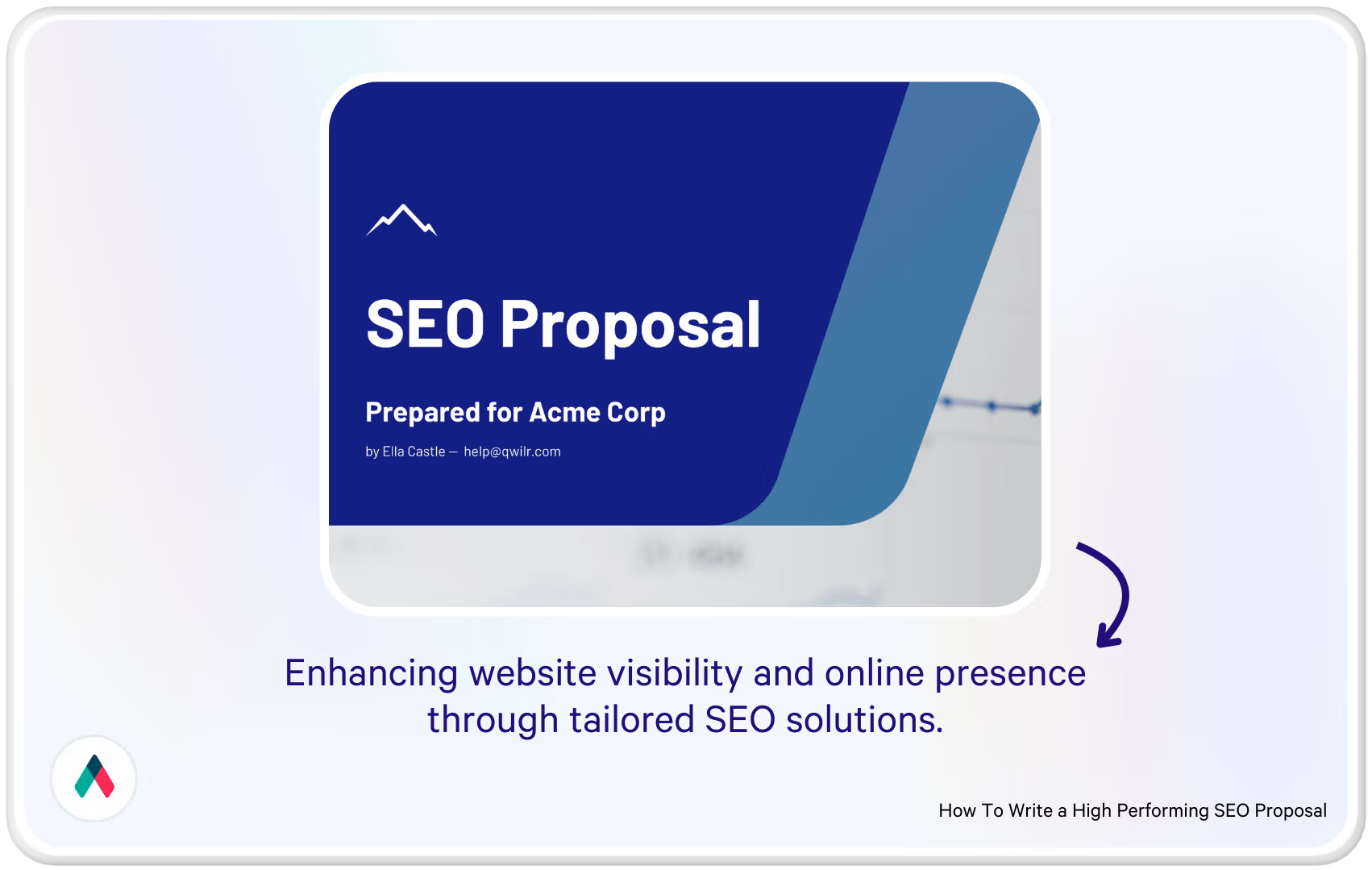
You can see our SEO proposal template for a visual example below:
Basic elements of an SEO proposal
Regardless of your project, scope, or client, there are some non-negotiable inclusions that every SEO proposal should feature. These are:
- Introduction/Executive Summary
- Insights on current SEO performance
- Solutions and project proposals
- Investment
- Timeline
- Call to action
Ben Major, Director of Organic Growth Strategy and SEO expert sums it up nicely:
Simply put, the proposal should directly address the client’s needs and can be distilled down into the following format - what is the size of the prize? - how much is it going to cost to get there? - and how long is it going to take?
How to write an SEO proposal in 9 Steps
Writing an SEO proposal can be as easy as following a well-marked trail. It's about turning your expertise into a clear, engaging plan that lights the way for your potential customers. We'll simplify this process in clear steps so you can create a proposal that combines the technical side of search engine optimization with a story that speaks directly to your prospective client's needs.
1. Conduct a thorough client evaluation and initial audit
Start with a detailed evaluation of their current website. Your typical SEO discovery involves an audit of their existing setup: What keywords do they rank for, how user-friendly is their website, and the quality of their backlink profile? This is a kind of health check for the current SEO status, highlighting their strengths and improvement areas.
In addition to gaining a deep understanding of their current technical SEO and on-page SEO, it's just as important here to get a good understanding of your client's business goals. Have a conversation with them. Do they want to increase their online sales, boost their brand visibility, or something else? If you know their goals, you can create a perfectly tailored proposal to their needs.
Impress your clients by adding these insights to your SEO proposal:
- Keyword research analysis: Outline current keyword rankings, missed opportunities, and keywords that have room for improvement. These should be hyper-relevant to your clients’ niche and user search intent.
- SEO website audit: Provide a top-level audit of the websites’ technical and content SEO metrics. Highlight quick wins—for example, broken links or missing meta tags.
- Competitor analysis: Provide a comparison between your client’s website and key competitors based on SEO metrics such as keyword rankings, backlinks, SERP real estate, and content strategies.
- Backlink analysis: Dive into your client’s backlink profile to understand the quality and impact of referring domains and where improvements can be made.
I like to take a fully tailored approach, digging into the client's website with their ICP and goals in mind. I also like to understand the competitors that are on their mind and who they're really keen to beat - I compare them to and review these competitors (and others) for missed opportunities, identify areas from improvement on the client's site, and spend time coming up with creative strategic ideas to include at a high level. I make sure to tie every opportunity I add back to their specific context and KPIs. This is crucial for helping the potential client to feel understood and heard, and for them to see a clear link between what is being suggested and their specific goals.
Alistair Pike, Growth Strategy Consultant
2. Identify SEO objectives
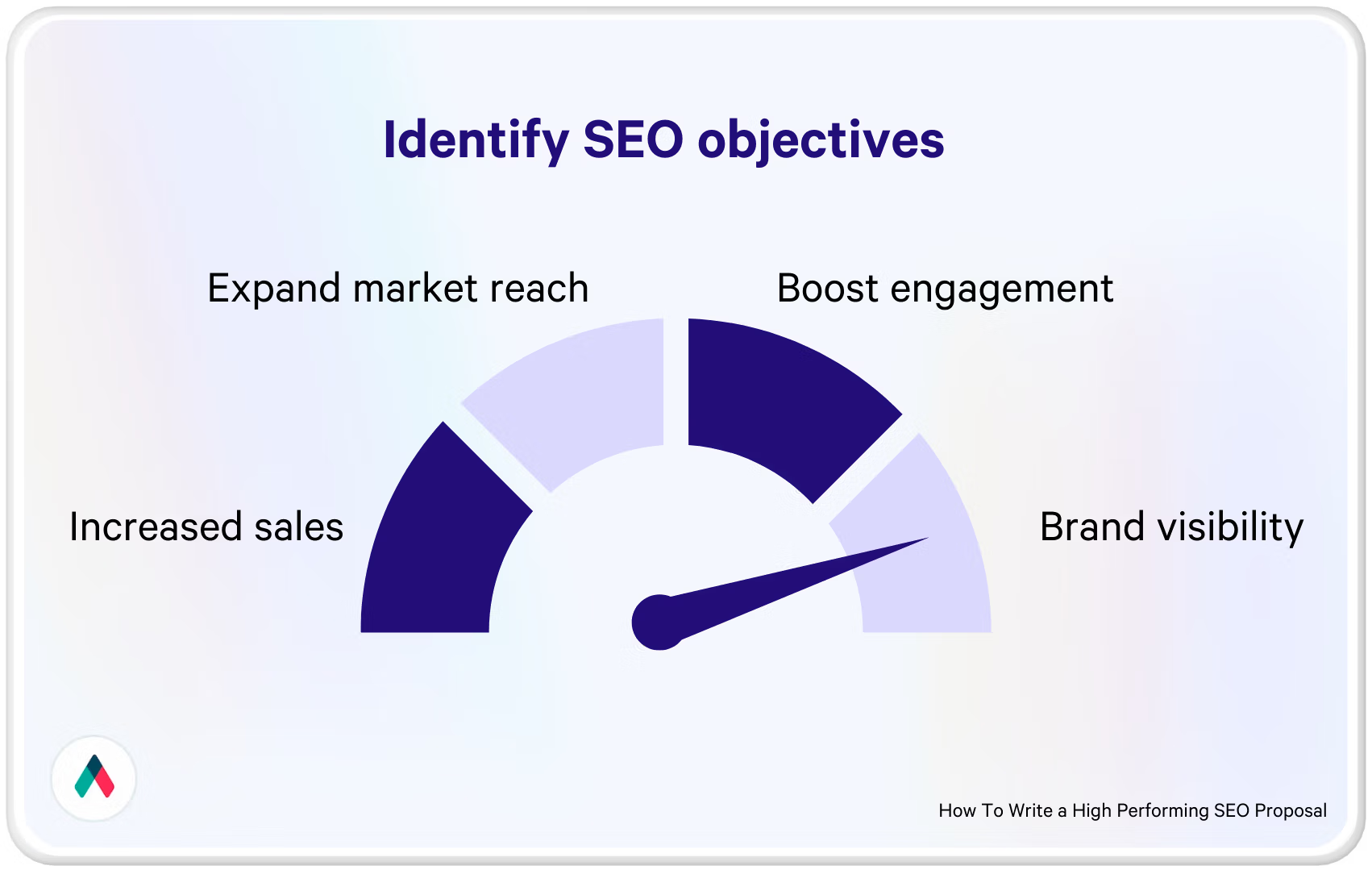
This is not about setting fluffy goals but determining your client's specific SEO objectives. Each objective should be specific and measurable.
For example, if the goal is to boost traffic, how much? And, by when?
If the goal is to rank better for certain search terms, determine what these keywords are.
These goals aren't just numbers but milestones that show how your SEO efforts contribute to your client's broader business goals, such as increased sales or brand visibility. When it comes to SEO, no one knows the exact algorithm that search engines use, so be conservative when sharing any specific numbers and don't promise specific ranking for specific keywords.
To ensure clarity, use a dedicated rank tracker such as SE Ranking to determine the specific metrics range you aim to monitor with your client. This approach allows you to showcase the dynamic nature of your progress and demonstrate how your SEO strategies are moving in the right direction.
It’s too easy to fall back on increased traffic and rankings as the main SEO objectives—ultimately, these are vanity metrics. Stick out from the crowd by providing objectives tied to revenue.
Alistair Pike, Growth Strategy Consultant explains:
“I like to understand the client's KPIs and real business objectives - first prize is getting it straight from them by asking. The second best is reviewing the site to get a sense of where they're leading visitors and what actions they're calling. This can give us a good idea of the top-level KPIs. If we don't get any specific goals from the client that we can work backward from, we can work forward from the search data we find. We can apply benchmark conversion rates to traffic figures to establish projections for various tactics. I also make sure to always tie the objectives back to revenue—the growth of which is the ultimate objective.”
3. Create a tailored SEO strategy specifically for your client
Once you know your client's goals and needs, the next step is to develop an SEO strategy tailored to your client's needs. Whether you focus on content, on-page optimization, or link building, each part of your strategy should directly align with your client's goals and appeal to their target audience.
Alistair says:
Demonstrating compelling ideas and how they relate to the client's ICP and objectives is the most important aspect of an SEO proposal. This shows them that you have the solution to their pain points.
This is where you show your client how your SEO analysis and expertise will turn their objectives into reality. You should provide a clear, personalized roadmap for improving your client's online presence and achieving their business goals.
It’s very important to keep in mind client-specific requirements and resources when creating your strategy—avoid a ‘one-size-fits-all’ approach if you want your SEO proposal to stand out.
We're taking a page out of Ben's book:
For example - if you know the client lacks significant developer resources (and you've found no high-priority issues during your research), it's probably best to omit any technical insights from the proposal and focus on more tangible issues, especially if they were purposefully brought up during the initial discussion.
4. Add a personal touch
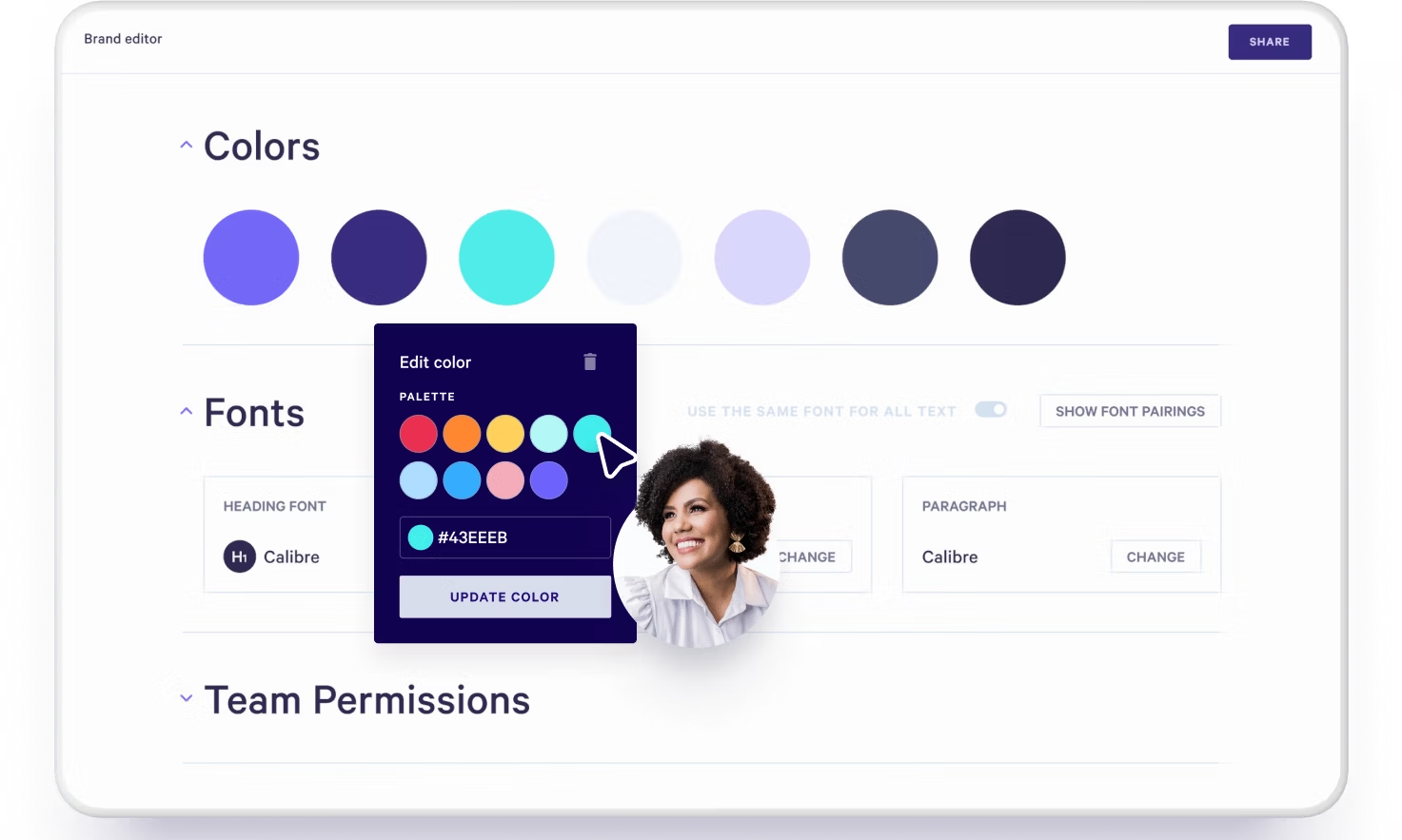
Aside from including all the meaty details, personalizing your SEO proposals is a great way to stand out and ensure that your proposal gets into the hands of key decision-makers.
Always address the prospect(s) by name, including industry trends, insights, and relevant case studies that showcase how you’ve solved problems for similar clients.
At Qwilr, our account executives are big fans of adding a human element with a Loom video overview of important aspects of the proposal.
I like to go granular with my proposals and accompany them with a 5-10 minute Loom. It's highly likely that more than one person will be reviewing the proposal client-side, so doing this provides deep insights for data nerds as well as a bird's eye view for others involved who may want more of an overview.
Ben Major, Director of Organic Growth Strategy
5. Utilize SEO templates for efficiency
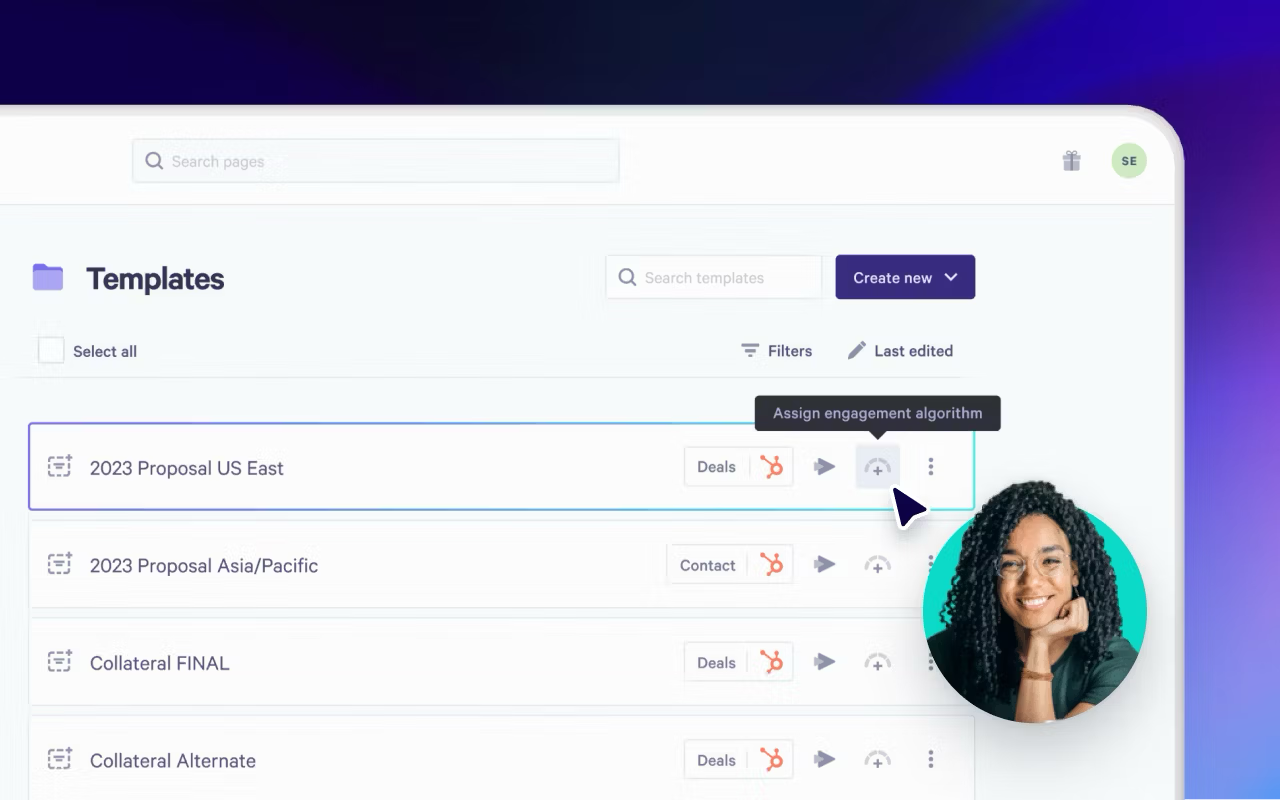
Efficiency is key when writing an SEO proposal. And this is where using an SEO proposal template can make all the difference. Don't think of these templates as shortcuts but as a guide for experts. They provide a solid structure for your proposal and ensure you consistently cover all the essential elements. The real magic of an SEO template lies in its flexibility. While the basic structure remains the same, you have the freedom to tailor the details to each client's specific needs.
Using proposal software or a template will enable you to save time and maintain quality so you can focus on customizing your offering. If you're looking for a reliable place to start, check out Qwilr's SEO template. It balances structure and customization perfectly, making your proposal writing process smoother and more effective.
6. Write an engaging executive summary
The summary in your SEO proposal is your chance to make a good first impression. This is where you capture your client's interest right from the start.
Here, you explain what you know about the client's needs, what specific goals you want to achieve, and how you intend to achieve them. Facts and figures are good but it's also about weaving a narrative that resonates with your customer: 'I understand you, I've got a plan, and here's why you should listen.'
This forms the core of most effective sales methodologies.
When writing an executive summary, you should be compelling yet concise, detailed but not overwhelming. Emphasize your unique approach, but keep it easily digestible. It can be a fine line to skate, admittedly!
7. Outline the scope of work and deliverables
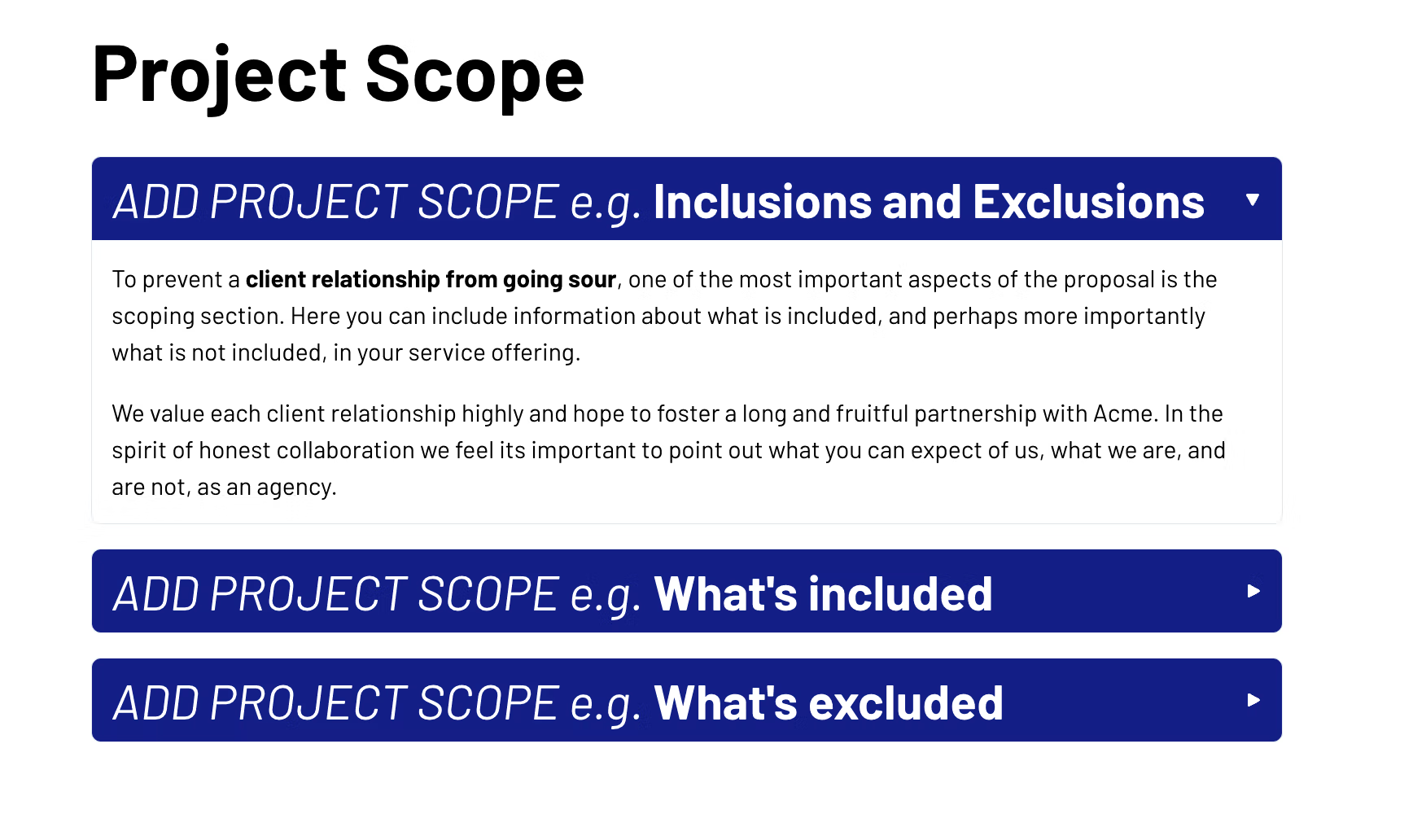
In this section, you define exactly what you'll do and what your client can expect in return. It shows specific steps you'll take, e.g., keyword research, content gap analysis, or content optimization, and what results these measures will bring.
This isn't just about listing tasks but also about setting clear expectations. Explain what each part of the project involves, what milestones you want to achieve, and what specific results your client will see, e.g., a better search ranking or more visitors to their website.
You create trust and transparency by clearly defining the scope of the work and the results. Your client knows what they're getting, and you have a defined plan to guide your SEO efforts.
8. Set clear timelines
In your SEO proposal, it is important to create a clear schedule. This is where you outline when the individual parts of the SEO project will begin and end.
There are a few variables to consider here, but I see a lot of proposals that lack time for feedback and iteration. There is no guarantee that the deliverable will be 'accepted' on submission, with the best deliverables often turning into living, breathing documents that you and the client will continue to iterate on. For longer timelines, I simply block these by month (Deliverables A, B and C to be completed and sent to the client by the end of November). Trying to distill this down to specific dates or weeks can complicate things and create an unnecessary sense of urgency.
Ben Major, Director of Organic Growth Strategy
These schedules are about keeping track of tasks and showing your client that you're organized and committed to timely results. Remember that SEO is a gradual process, a long-term play for long-term gains, so include time for regular updates and adjustments to your strategy.
Be realistic with your timelines. Take into account the amount of work involved and any external factors that could affect the schedule—and remember to allow time for feedback and revisions. Clear timelines will help manage client expectations while ensuring everyone knows when to expect progress and results.
9. List pricing options

Make sure your pricing is easy to understand. Explain each pricing tier and option with a clear explanation of what it entails and the benefits it brings to your business. Whether to increase website visibility or drive traffic, show how each pricing tier adds value to them.
In this part of the proposal, you help your client make an informed decision. You give them the flexibility to choose a service that meets their needs and budget, making it clear what they can expect from their investment.
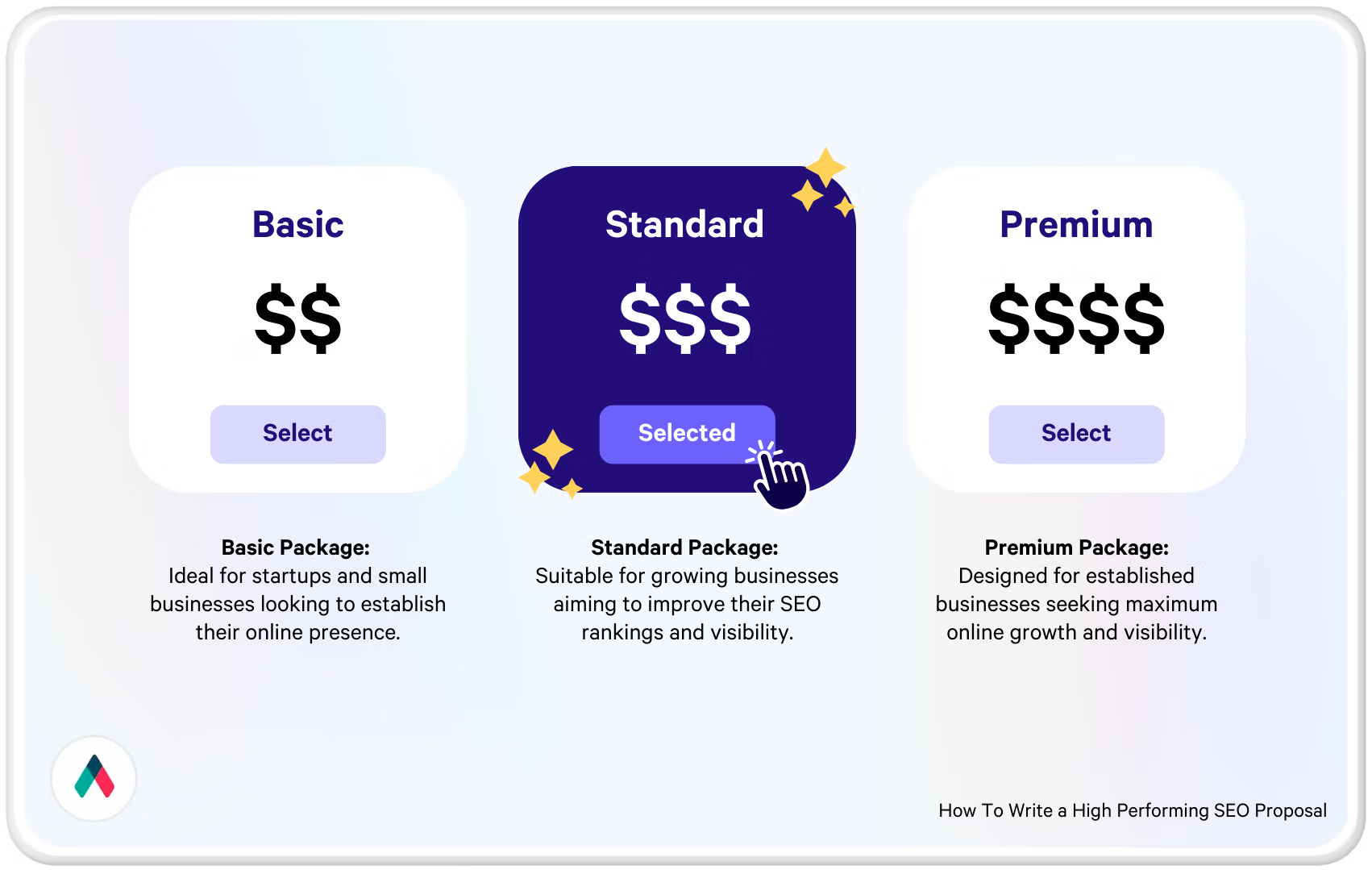
Include pricing breakdowns and the ability of clients to accept, sign, and pay—all within your Qwilr web-based proposal document
SEO proposal template
In our SEO proposal template, you will find a clear example of structuring a compelling SEO offer.
It’s a straightforward guide that covers everything you need to include in your proposal:
- The Challenge/Needs: Here, we identify the client's specific SEO challenges and needs, setting the context for your proposal.
- The Process: This is where you outline the methodology and the step-by-step path you want to take with your client’s website. It’s about showing a clear path from problem to solution, from current challenges to future successes.
- Project Scope: Here, you'll describe the specific measures and tasks you'll carry out. From on-page optimization to content strategy, you'll find a comprehensive overview of the nuts & bolts of your plan here.
- Project Investment: This is not just a price list but a clear, value-oriented presentation of your pricing options. You need to make it easy for customers to understand what they're getting at each price point and align investments with expected outcomes.
- Recent Client Wins: Here, you can show off your track record. You can demonstrate your expertise, showcase your success stories, and show how you’ve helped other clients achieve their SEO goals.
- Next Steps: This is where you guide the client on how to proceed. It’s a call to action that encourages them to take the leap to better SEO with your help.
- Conclusion: End the proposal on a high note. You should emphasize the potential benefits and positive outcomes of choosing your services.
Our template guides you through all the crucial components and ensures your proposal is comprehensive and appealing. With this template, you're offering more than just a strategy; you're presenting a path to success. The best proposal examples share this trait.
Alternatively, you can try our AI proposal generator for free and create your own professional looking proposal in minutes.
Create outstanding SEO proposals with Qwilr
Writing a winning SEO proposal involves understanding your client’s needs, setting clear goals, crafting a customized strategy, and being transparent with pricing. It’s about creating a proposal that outlines your plan and aligns with your client's goals.
Want to give yourself a head start? Check out Qwilr’s SEO proposal template. It’s the perfect tool for creating professional, customizable proposals and getting right to the heart of your client's needs. And- if we don’t say so ourselves- it doesn’t look too shabby either….
About the author

Brendan Connaughton|Head of Growth Marketing
Brendan heads up growth marketing and demand generation at Qwilr, overseeing performance marketing, SEO, and lifecycle initiatives. Brendan has been instrumental in developing go-to-market functions for a number of high-growth startups and challenger brands.
FAQs
The best format for an SEO proposal is clear and simple. It should lay out the strategy, scope, timeline, and cost in an easy-to-understand and engaging way so the client can follow your plan and recognize the value of your proposal.
A free SEO proposal template can be a good starting point, especially if you're new to creating such documents. It provides a structured framework that ensures you cover all the critical aspects. Make sure you tailor it to your client's needs for a more personal touch.


